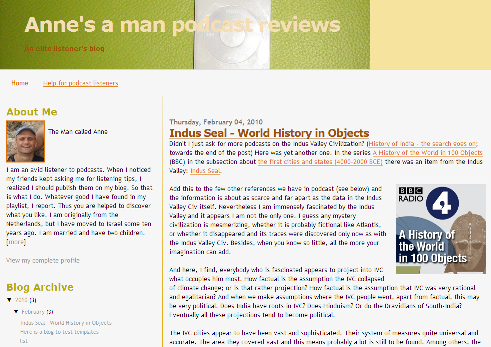Europe from its origins (review, site, feed)
A very commendable enhanced podcast and vodcast that is made by an amateur, but displays professional quality to form as well as content. Host Joe Hogarty explores Europe's roots into the Roman empire and meticulously follows them through to the Middle Ages. This podcast not only tells the tale in a very good way, it also attempts to make the argument that Europe never slid into such level of uncultured backwardness that would justify the treatment of the early Middle Ages as a Dark Age and could contribute Europe's eventual delivery from this alleged barbarian phase solely to intermediaries to the Classical world such as Byzantium and the world of Islam. Part of this argument is also a strong defense against the modern description of the Crusades as the pinnacle of cruelty and destructiveness. And in addition to all this, there is a fine supply of contemporary, if reconstructed, music.
 Archaeo News (review, site, feed)
Archaeo News (review, site, feed)Promotional and informative podcast from a general website about archeology called The Stone Pages. The podcast digs into news items in archeology and does so in a very engaged and lively fashion.
History 151c - The Peculiar Modernity of Britain (Berkeley) (review, site, feed)
Professor James Vernon lectures about recent history of Great Britain.
MMW 5 - Revolution, Industry & Empire (UCSD) (review, site, feed)
Professor Heidi Keller-Lapp lectures about world history during the period 1750-1914. A lot of emphasis is given to the development of political thought, especially on the subject of the social contract.
Paste the link
http://feeds2.feedburner.com/Anne_Is_A_Man
into the RSS reader of your preference. (What is RSS? - Help on getting subscription)
I love to get new podcast recommendations. You can let me know your preferences by commenting on the blog or sending mail to Anne is a Man at: Anne Frid de Vries (in one word) AT yahoo DOT co DOT uk
Connect with Anne is a Man on
Facebook,
The Podcast Parlor on Ning.
The Podcast Parlor on Facebook.



.jpg)














